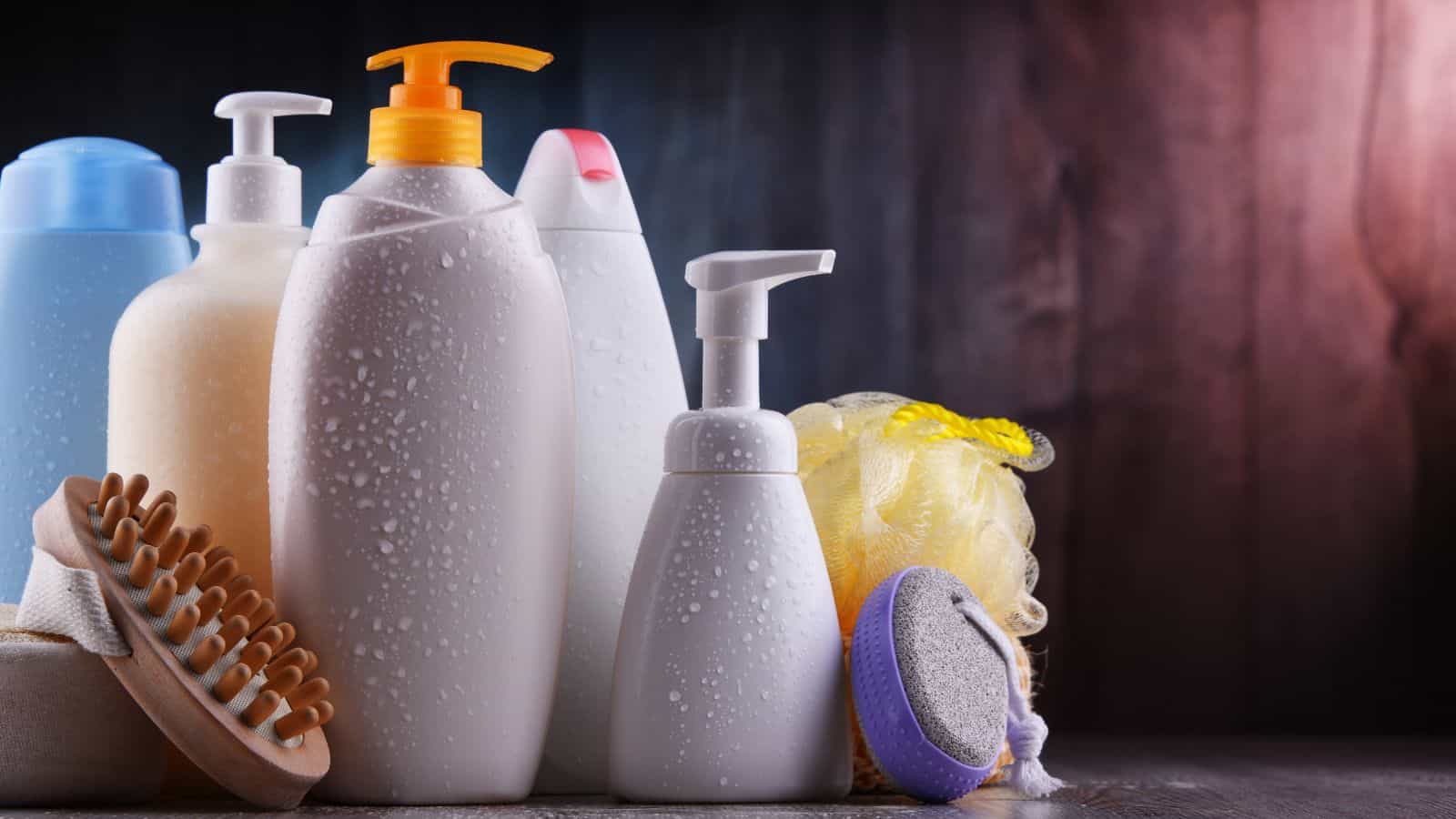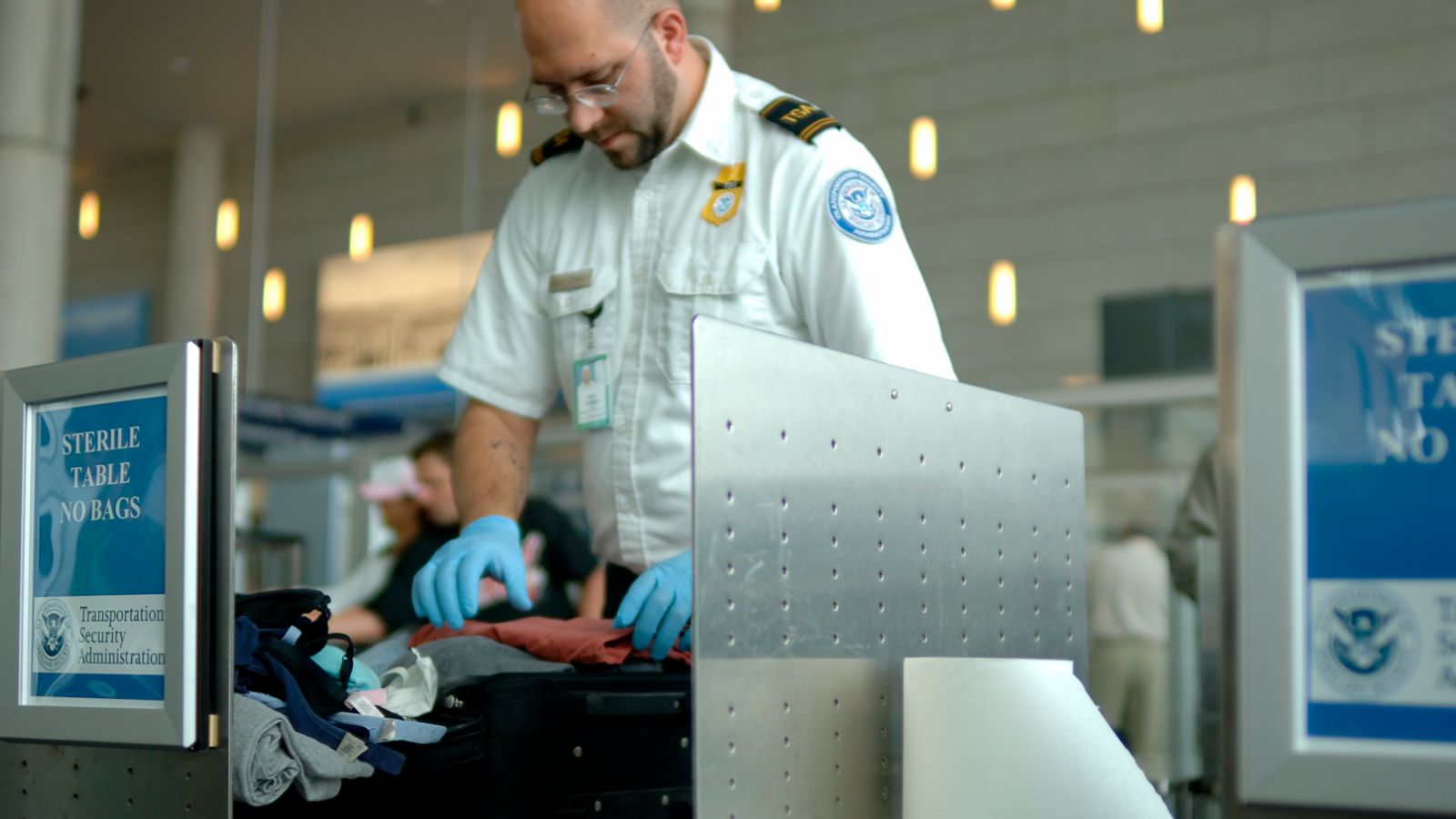Some items are best kept in carry-on luggage when flying; others cannot be taken at all. Travelers flying internationally or within the U.S. should check the Transportation Security Administration website to ensure they can take their items in their checked luggage, but here are 17 items to avoid.
Oversized Liquids and Gels

Restrictions on liquids over 3.4 ounces apply to carry-on luggage, and larger quantities in checked luggage also raise red flags. The TSA website advises carry-ons “must follow the 3-1-1 liquids rule” of one clear plastic bag per passenger with 3.4 ounces max per container.
Incorrectly Stored Firearms and Ammunition

Firearms and ammunition can be taken as checked luggage, but they are subject to strict regulation. The Hill spoke to a TSA spokesperson who said, “The most important thing you need to do is to make sure it’s completely unloaded.” Firearms must also be declared and properly secured in a hard-sided, locked case, and ammunition must be securely packed.
Explosive Materials and Fireworks

All explosive materials, including fireworks and seemingly harmless items like sparklers, are prohibited from both carry-on and checked luggage. Ignorance of these rules can result in security alerts and legal consequences, so travelers should ensure they don’t attempt to fly with fireworks.
Flammable Items and Lighters

Cabin Zero notes that the TSA allows disposable and Zippo lighters without fuel on checked luggage, but other lighters are strictly prohibited. Special regulations apply to safety matches and certain types of batteries, so travelers should check TSA guidelines before packing.
Unsheathed Sharp Objects and Tools

Sharp objects, like box cutters, corkscrews, disposable razors, and knives, are generally allowed in checked luggage. However, TSA guidelines are clear that “any sharp objects in checked bags should be sheathed or securely wrapped to prevent injury to baggage handlers and inspectors.”
Incorrectly Stored Pepper Spray

Self-defense items like pepper spray are subject to strict TSA regulations. According to the TSA website, pepper spray is permitted in checked luggage “provided it is equipped with a safety mechanism to prevent accidental discharge,” and sprays with more than 2% tear gas are prohibited.
Batteries and Power Banks

TSA regulations state that spare lithium batteries, power banks, and e-cigarettes must be carried in carry-on luggage, not checked, and are subject to airline approval. Travelers should properly pack and declare their batteries and power banks to prevent delays.
Perishable Foods and Beverages

Certain perishable foods may be subject to restrictions based on destination laws or spoilage concerns, but TSA regulations generally allow food and beverages in checked luggage. Alcohol levels above 70% are not permitted.
Large Quantities of Powders

Powders over 12 ounces, including protein powders, flour, sugar, and ground coffee, may require additional screening, and suspicious quantities in checked luggage can be confiscated. To avoid complications, travelers should ensure their powders are under 12 ounces in their checked luggage.
Electronic Devices

Allianz Travel notes that, while allowed, “electronics, such as video game systems and computers,” are better stored in carry-on luggage. High-value electronic devices are at risk of theft, so travelers are better off packing them in an easily accessible way for checked luggage inspection.
Pressurized Containers

Pressurized containers, like CO2 cartridges or scuba tanks, have specific packing requirements and restrictions, so travelers must check TSA regulations. Travel Tips notes, “TSA regulations require scuba tanks to travel empty and without the valve, so the interior of the tank is open to inspection.”
Chemicals and Toxic Substances

Chemicals and toxic substances, including chlorine, bleach, and fertilizers, are not allowed in checked luggage. Nally Studios notes, “TSA says liquid bleach is a no-go in carry-on and checked bags.” Even smaller amounts of these items can lead to luggage being opened and inspected, so travelers should ensure they don’t accidentally leave any in their bags.
Medical Equipment and Supplies

Medical equipment and supplies should be declared to TSA officers when traveling. Some medical supplies and equipment might require additional screening or documentation, so travelers should pack a copy of their prescription and clearly label all their medications.
Fragile and Valuable Items

The TSA recommends carrying valuable and fragile items in your carry-on luggage, but if they must be checked, travelers should use sturdy packaging and consider insurance. Checked luggage is subject to handling that generally isn’t suitable for delicate items.
Pets and Live Animals

Pets and live animals cannot be transported in checked luggage, and some airlines don’t allow them to be taken in carry-on bags. For those permitted in cargo, stringent regulations regarding carrier size, ventilation, and labeling apply, so airline policies should always be checked before travel.
Large Sums of Cash

While not prohibited, traveling with large sums of money or financial instruments can lead to additional questioning, with TSA officials asking passengers to account for the money. U.S. Customs and Border Protection advises that international travelers to the U.S. must declare cash or monetary instruments worth over $10,000 combined.
Cultural Artifacts and Historical Items

Cultural artifacts and historical and religious items may be subject to export restrictions from their country of origin, and the TSA may flag items of significant cultural or historical value for further inspection.
Read More: 15 Ways To Tell If Someone Is Not a Good Person

While it’s important to avoid quick judgments, certain behaviors can be strong indicators of a person’s character. Here are 15 ways to discern if someone might be a bad influence or possess harmful traits.
15 Ways To Tell If Someone Is Not a Good Person
Why People Aren’t Religious Anymore: 15 Simple Reasons

As society evolves, so does our approach to spirituality. This article looks at the subtle yet profound shift from traditional religious adherence to a more personal, evidence-based belief system.
Why People Aren’t Religious Anymore: 15 Simple Reasons
17 Things That Used to Be Highly Respected But Aren’t Anymore

Many things in the world used to be well-respected before turning into complete jokes for various reasons. An internet survey recently asked people, “What is something that was once highly respected but is now a complete joke?” Here are the top 20 answers:
17 Things That Used to Be Highly Respected But Aren’t Anymore
17 Fairy Tales That Are Now Considered Racist

While fairy tales weave magical narratives that span generations, many emerge from historical and cultural contexts tinged with biases. Hiding in many of these tales, racial undertones can be found. Let’s look at 17 fairy tales that have deeper implications.
17 Fairy Tales That Are Now Considered Racist
19 Untrue American Stereotypes That Are Widely Believed Internationally

Stereotypes and misconceptions can be misleading and frustrating, especially when they pertain to nationalities. Let’s explore and debunk some common myths about America, as shared by internet users.
19 Untrue American Stereotypes That Are Widely Believed Internationally

